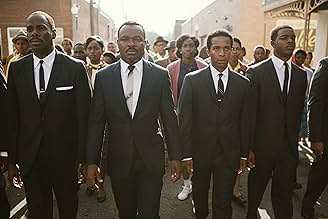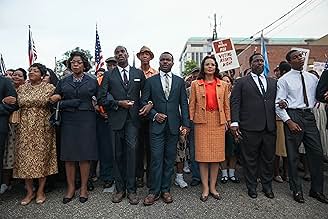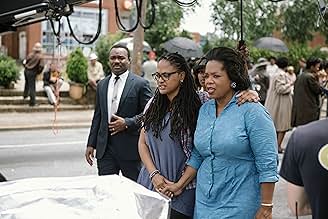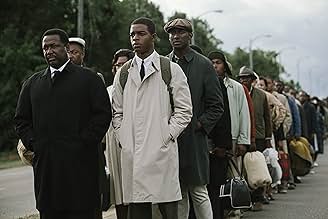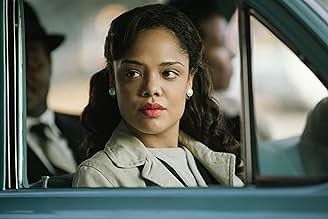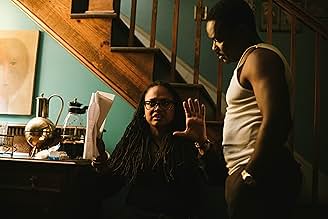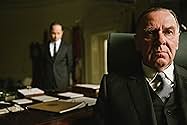Selma
- 2014
- Tous publics
- 2h 8min
Le récit de la campagne de Dr. Martin Luther King pour obtenir le droit de vote lors d'une marche épique de Selma à Montgomery, Alabama, en 1965.Le récit de la campagne de Dr. Martin Luther King pour obtenir le droit de vote lors d'une marche épique de Selma à Montgomery, Alabama, en 1965.Le récit de la campagne de Dr. Martin Luther King pour obtenir le droit de vote lors d'une marche épique de Selma à Montgomery, Alabama, en 1965.
- Réalisation
- Scénario
- Casting principal
- Récompensé par 1 Oscar
- 58 victoires et 91 nominations au total
- Girl #5
- (as Nadej Bailey)
- James Orange
- (as Omar Dorsey)
Avis à la une
March 7, 1965 is known as Bloody Sunday and marks one of the most despicable moments in U.S. history. It was also a turning point in the Civil Rights Movement and can be viewed as shrewd strategy from Martin Luther King, Jr. and his organization, the Southern Christian Leadership Conference. The movie makes it clear that MLK had a full understanding that Selma, Alabama and it's racist, redneck Sheriff Jim Clark provided the perfect opportunity for a violent reaction to King's demonstrations and protests. It also makes it very clear that there was boundless ignorance, hatred and racism on the part of many southern whites. If the subject matter is somehow not enough to grab your attention, the startling event that occurs 5 minutes in will surely leave you shaken.
The film does an outstanding job of focusing on two pieces of this most complex puzzle: 1. the boots on the ground – the grass roots movement of the people, and 2. the ongoing political debates occurring between MLK and LBJ, between LBJ and his staff, and between MLK and his lieutenants.
The Civil Rights Act had already been passed, so the efforts were in hopes of overcoming the obstacles faced by southern blacks who wished to vote. One of the film's best scenes has activist Annie Lee Cooper (Oprah Winfrey) trying yet again to have her voter registration processed, but being rebuffed by a county clerk through an impossible Q&A session. These intimate moments are where the film excels: Coretta questioning MLK on his love for her, MLK speaking with grandfather of Jimmie Lee Jackson outside the morgue, and MLK turning down the proposal of US Attorney John Doar (Alessandro Nivola).
In an odd twist of casting, four of the leading characters are played by Brits: David Oyelowo as MLK, Tom Wilkinson as LBJ, Tim Roth as George Wallace and Carmen Ejogo as Coretta Scott King. All four are excellent, but it's Mr. Roth as the racist-beyond-belief Alabama Governor Wallace that is the most slitheringly evil, while Mr. Oyelowo gives what can only be described as a towering performance of the man many of us know only from history books and news reels (and a January holiday).
The supporting cast is vast and talented, and because the story spends so much time on the individuals, many of these spend little time on screen. In addition to Andrew Young (Andre Holland), Reverend Hosea Williams (Wendell Pierce), J Edgar Hoover (Dylan Baker), and Lee C White (Giovanni Ribisi), we also see activist Diana Nash (Tessa Thompson), CT Vivian (Corey Reynolds), John Lewis (Stephen James), and Judge Johnson (Martin Sheen). The most bizarre moment has Malcolm X (Nigel Thatch) in a quasi-Mr Rogers depiction as he discussed his new found approach with Coretta.
The original King speeches are owned by another studio so those delivered here by Oyelowo have been re-written and revised, yet the words and Oyelowo's powerful oratory deliver the message loud and clear. While it can be argued that the film delivers only one point of view (the FBI was no friend to the movement), it can just as easily be argued that previous films have done the same thing – only from the "other" perspective (Mississippi Burning, Ghosts of Mississippi).
In what can be viewed as the first serious movie on Martin Luther King, director Ava DuVernay announces her presence with authority. She will have no need to return to her career as a movie publicist, and we will be watching to see what type of projects appeal to her after this. In a brilliant move, the story focuses on a period of just a few months in 1965, rather than tackling the MLK legacy. She presents him as a man with strengths, flaws, doubts, and determination. It's clear why so many followed him, and it's all the more painful to know that so many resisted.
David Oyelowo's portrayal of Martin Luther King Jr. was so spot-on that I was immediately drawn in to see every detail of the film play out. I was disturbed and further curious at the same time amongst every scene that unfolded during the key moments of the film.
Basically, it featured how much King sacrificed and went through in the 1960s to maintain blacks rights to vote and eliminate segregation from all states. I couldn't believe how much violent injustice and racial discrimination were used to intimidate innocent people who were trying to have the same rights like many in America.
Oprah Winfrey, Cuba Gooding Jr, and rapper-actor Common brought out great performances as the individuals who stood up for what they truly believe in and they wouldn't let hate stand in their way. Tom Wilkinson's portrayal of President Lyndon B. Johnson was rather physically uncanny and his scenes brought out the angst of what he had to face at a time when violence was further escalating during the Civil Rights Movement. Tim Roth as Governor George Wallace made me feel to hate the man for his segregationist beliefs, but when confronted by President Johnson himself, it just got real.
The juxtaposition of real-life archive footage in the movie gave a nice touch to how very genuine these people of Selma endured plenty of horrible confrontations. Whether these usually ended in violence or even death, they just kept growing in numbers and overcome all who stood against their true beliefs in racial equality.
My only nitpick was that of President Johnson's confrontations with Martin Luther King himself. I've learned in the history books that they've had their fair share of disagreements, but nothing this intense as shown on screen. Nevertheless, it proved that being an American President was no easy feat at a very difficult time. Overall, this is a film that didn't require lengthy (moving) MLK speeches, instead it focused on tense confrontations black people had to endure and how one individual stood tall and fought back not with violence, but with powerful words and strong beliefs. I applaud David Oyelowo and director Ava DuVernay for providing a glimpse into how racism was overcome by one profound man whose legacy still reverberates to this day.
I loved it. It should have gotten more Academy Award nominations than it did. Especially for the actors who played Martin and Coretta King. I can't believe they are not even Amerian actors. Nicely done accents. The actor who played LBJ was also very good, but being from Texas I was not as convinced by his accent. If I was on the Board for the Academy Awards I definitely would nominate this movie for Best Picture, Best Director, Best Actor, Best Supporting Actress - at minimum.
As for the story, yes, it was not "historicly accurate," but it flowed well and Ava DuVernay and Paul Webb did a wonderful job of making it family friendly, which is very hard to do with such a sensitive subject. I would compare it to Disney's "Remember The Titans" on how they changed the story to make it more entertaining and also family friendly.
Overall, I would highly recommend this movie. It did a great job of showing me a bit of the past that was before my time and I am grateful for that experience.
Le saviez-vous
- AnecdotesThe explosion in the opening scene is the infamous 16th Street Baptist Church bombing, which occurred in Birmingham, Alabama on September 15, 1963. The 4 young girls killed in the bombing were Addie Mae Collins, Denise McNair, Carole Robertson, and Cynthia Wesley.
- GaffesWhen MLK meets with LBJ in the Oval Office, Johnson is seated at the Resolute Desk. When Lyndon B. Johnson took office in 1963, he found he was too large for the desk, and commissioned a plainer replacement which was built by the Senate cabinet shop.
- Citations
Martin Luther King Jr.: [somberly yet passionately speaking to church congregation at a funeral] Who murdered Jimmie Lee Jackson? Every white lawman who abuses the law to terrorize. Every white politician who feeds on prejudice and hatred. Every white preacher who preaches the Bible and stays silent before his white congregation. Who murdered Jimmie Lee Jackson? Every Negro man and woman who stands by without joining this fight as their brothers and sisters are brutalized, humiliated, and ripped from this Earth.
- Crédits fousMartin Sheen is not listed in the credits.
- Bandes originalesOne Morning Soon
Written by Traditional
Performed by Joyce Collins & Johnita Collins
Courtesy of Tompkins Square, LLC
Meilleurs choix
- How long is Selma?Alimenté par Alexa
Détails
- Date de sortie
- Pays d’origine
- Sites officiels
- Langues
- Aussi connu sous le nom de
- Selma: el poder de un sueño
- Lieux de tournage
- Selma, Alabama, États-Unis(foot of Edmund Pettus Bridge - scene of Bloody Sunday)
- Sociétés de production
- Voir plus de crédits d'entreprise sur IMDbPro
Box-office
- Budget
- 20 000 000 $US (estimé)
- Montant brut aux États-Unis et au Canada
- 52 076 908 $US
- Week-end de sortie aux États-Unis et au Canada
- 571 450 $US
- 28 déc. 2014
- Montant brut mondial
- 67 782 762 $US
- Durée
- 2h 8min(128 min)
- Couleur
- Mixage
- Rapport de forme
- 2.35 : 1







